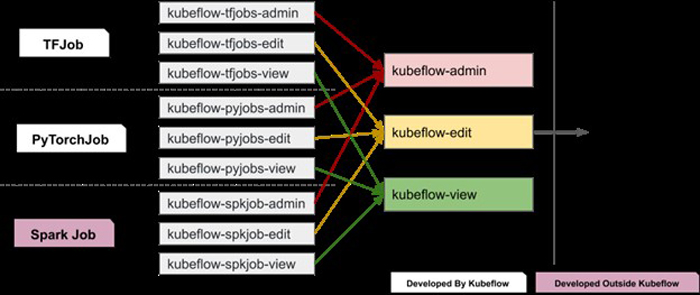Before Installing Kubeflow
Kubeflow automatically assigns the following Kubeflow-specific aggregating cluster roles:
-
kubeflow-admin -
kubeflow-edit -
kubeflow-view

See the following resources for more information on how Kubeflow implements RBAC. The following links open external websites in a new browser tab or window:
System Requirements
For supported Kubernetes versions, see Kubernetes Version Requirements. For issues and workarounds, see Issues and Workarounds.
The following resources must be available to install Kubeflow:
-
Minimum number of nodes for compute cluster: 2 (1 master, 1 worker)
-
Minimum core and memory resources required:
-
CPU Cores: 36
-
Memory (GB): 160
-
Dynamic Volume Provisioning for Persistent Volumes
Persistent Volumes for Kubeflow are dynamically provisioned using a default Storage Class.
-
If you are using HPE Ezmeral Data Fabric, a default Storage Class is created and marked as
default. For example:kubectl get sc NAME PROVISIONER RECLAIMPOLICY VOLUMEBINDINGMODE ALLOWVOLUMEEXPANSION AGE cluster-1664736275961 (default) com.mapr.csi-kdf Delete Immediate true 19h cluster-1664736275961-nfs com.mapr.csi-nfskdf Delete Immediate true 19h hpe-hdd-storage kubernetes.io/no-provisioner Delete WaitForFirstConsumer false 19h hpe-nvme-storage kubernetes.io/no-provisioner Delete WaitForFirstConsumer false 19h hpe-ssd-storage kubernetes.io/no-provisioner Delete WaitForFirstConsumer false 19h -
If you are using a storage configuration other than HPE Ezmeral Data Fabric on Kubernetes, mark a Storage Class as
defaultprior to Kubeflow installation.Use the following command to mark a Storage Class as
default:kubectl patch storageclass <storage-class-name> -p '{"metadata": {"annotations":{"storageclass.kubernetes.io/is-default-class":"true"}}}'For information on available storage configurations, see Storage.
-
MinIO can be configured to provide Kubeflow persistent volumes. For information, see Configuring External MinIO.
Kubeflow Components
See Support Matrixes.
